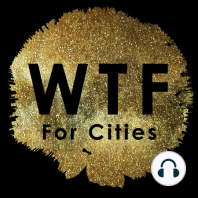11 min listen

086R_Advancing landscape sustainability science: theoretical foundation and synergies with innovation in methodology, design and application (research…
086R_Advancing landscape sustainability science: theoretical foundation and synergies with innovation in methodology, design and application (research…
ratings:
Length:
11 minutes
Released:
Oct 17, 2022
Format:
Podcast episode
Description
Are you interested in landscape sustainability science and its application?
Summary of the editorial article titled Advancing landscape sustainability science: theoretical foundation and synergies with innovation in methodology, design and application from 2020 by Chuan Liao, Jiangxiao Qiu, Bin Chen, Deliang Chen, Bojie Fu, Matei Georgescu, Bhunyang He, G. Darrel Jenerette, Xia Li, Xiaoyan Li, Xin Li, Bading Qiuying, Peijun Shi, and Janguo Wu, published in the Landscape Ecology journal.
Since we are investigating the future of cities, I thought it would be interesting to see how landscape sustainability science as a place-based, use-inspired science can improve the dynamic relationships between ecosystem services and human well-being. This article presents the theoretical foundation of landscape sustainability science, discusses recent innovations and examines the applications to address sustainability challenges.
As the most important things, I would like to highlight three aspects:
Landscape sustainability science is rooted in sustainability science, resilience, landscape ecology, and many others to bring sustainability to the practice with various innovations such as modelling and scenario investigations.
Landscape design – as any intentional configuration of landscape compositions for providing ecosystem services and meeting societal needs – provides a platform for scientists and stakeholders to apply scientific knowledge to support decision-making on landscape change.
The strong sustainability perspective suggests that long-term regional sustainability can only be achieved by integrating context-based sustainability in urban, agricultural and natural landscapes to minimize the regional ecological footprint.
You can find the article through this link.
Abstract: Our society has entered in an era of Anthropocene, in which people and their activities dominate almost all ecosystems on the planet. In the context of growing uncertainties, landscape sustainability science (LSS), as a place-based, use-inspired science, aims to understand and improve the dynamic relationship between ecosystem services and human well-being. In this editorial, we identify the major theoretical foundations of LSS, discuss recent innovations in research methodology to advance LSS, summarize the extension of LSS through landscape design and geo-design, and examine the application of LSS for addressing sustainability challenges across multiple landscapes. We highlight that long-term regional sustainability can only be achieved by integrating context-based sustainability across agricultural, urban, and natural landscapes so as to minimize the regional ecological footprint and make advancement towards achieving the sustainable development goals.
You can find the transcript through this link.
What wast the most interesting part for you? What questions did arise for you? Let me know on Twitter @WTF4Cities or on the wtf4cities.com website where the shownotes are also available.
I hope this was an interesting episode for you and thanks for tuning in.
Music by Lesfm from Pixabay
Summary of the editorial article titled Advancing landscape sustainability science: theoretical foundation and synergies with innovation in methodology, design and application from 2020 by Chuan Liao, Jiangxiao Qiu, Bin Chen, Deliang Chen, Bojie Fu, Matei Georgescu, Bhunyang He, G. Darrel Jenerette, Xia Li, Xiaoyan Li, Xin Li, Bading Qiuying, Peijun Shi, and Janguo Wu, published in the Landscape Ecology journal.
Since we are investigating the future of cities, I thought it would be interesting to see how landscape sustainability science as a place-based, use-inspired science can improve the dynamic relationships between ecosystem services and human well-being. This article presents the theoretical foundation of landscape sustainability science, discusses recent innovations and examines the applications to address sustainability challenges.
As the most important things, I would like to highlight three aspects:
Landscape sustainability science is rooted in sustainability science, resilience, landscape ecology, and many others to bring sustainability to the practice with various innovations such as modelling and scenario investigations.
Landscape design – as any intentional configuration of landscape compositions for providing ecosystem services and meeting societal needs – provides a platform for scientists and stakeholders to apply scientific knowledge to support decision-making on landscape change.
The strong sustainability perspective suggests that long-term regional sustainability can only be achieved by integrating context-based sustainability in urban, agricultural and natural landscapes to minimize the regional ecological footprint.
You can find the article through this link.
Abstract: Our society has entered in an era of Anthropocene, in which people and their activities dominate almost all ecosystems on the planet. In the context of growing uncertainties, landscape sustainability science (LSS), as a place-based, use-inspired science, aims to understand and improve the dynamic relationship between ecosystem services and human well-being. In this editorial, we identify the major theoretical foundations of LSS, discuss recent innovations in research methodology to advance LSS, summarize the extension of LSS through landscape design and geo-design, and examine the application of LSS for addressing sustainability challenges across multiple landscapes. We highlight that long-term regional sustainability can only be achieved by integrating context-based sustainability across agricultural, urban, and natural landscapes so as to minimize the regional ecological footprint and make advancement towards achieving the sustainable development goals.
You can find the transcript through this link.
What wast the most interesting part for you? What questions did arise for you? Let me know on Twitter @WTF4Cities or on the wtf4cities.com website where the shownotes are also available.
I hope this was an interesting episode for you and thanks for tuning in.
Music by Lesfm from Pixabay
Released:
Oct 17, 2022
Format:
Podcast episode
Titles in the series (100)
023R_Smart cities and disaster resilience (research summary) by What is The Future for Cities?